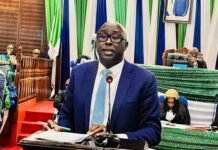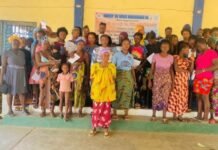By Abubakarr Harding
During the launch of a Policy Brief and the 2023 Media Gender Scorecard on the Coverage of Women in Politics, Peace and Security Issues in Sierra Leone organized by the Initiatives for Media Development ( IMDEV) on Tuesday, 21st February 2023 at the Atlantic Hotel, Lumley in Freetown, President of the Sierra Leone Association of Journalists (SLAJ), Ahmed Sahid Nasralla stated that the Association is a not-for-profit professional one that is advocating for the right to freedom of expression, free media, and democratic good governance.
He intimated all present that SLAJ recognizes that gender inequality is a major challenge in the media in Sierra Leone adding that while they acknowledge that discrimination, harassment and inequality on the basis of gender are not limited to the media, SLAJ has made it a priority to deal with those issues within the industry.
The SLAJ President underscored how the media in Sierra Leone is male-dominated, in terms of ownership and representation in leadership positions across individual media institutions as well as in SLAJ and its affiliate bodies.
He revealed that out of a total of 850 active SLAJ members only 170 are women. “We see significant changes in the electronic media, but the print media still has a long way to go,” he affirmed maintaining how Women in the media suffer unequal distribution of assignments in the newsroom stating that the male reporters are given assignments to cover hard news while female reporters are given soft beats.
Ahmed Sahid Nasralla also pointed out that Gender sensitive reporting in the media is also very low justifying that women journalists also say they face sexual harassment and intimidation in the media from their male colleagues and superiors saying they are only a few of the challenges female journalists face.
He suggested that to address those issues, SLAJ has set up a Gender Advisory Panel that comprise members and people from civil society to advise the Association on gender issues and conduct periodic gender audits that inform the way the Association formulate policies.
He said the Advisory Council when out-doored very soon will Review policies, processes and opportunities that engender bias and discrimination, and make sure SLAJ (and its sub-bodies) move towards a more gender equitable association which can be replicated in media houses owned by SLAJ members, will Develop gender-friendly policies which SLAJ can encourage media houses to adopt within management level and in their newsrooms, Work to conduct training that would help journalists cover women and girls better, Advise on the rebranding of the profession to be more inclusive and a friendly space for young females to aspire to and Encourage SLAJ to support affirmative action policies to increase the voices of females in the sector and to ensure that they thrive.
The SLAJ No 1 Man said currently the Advisory panel has completed a Draft Gender Policy that will be looked by the plenary as they source funds to take it nationwide.
He said meanwhile, strengthening the political participation of women in Sierra Leone through media monitoring of gender-sensitive reporting is important to the growth and development of the country.
The participation of women in politics is crucial for achieving sustainable development and good governance, he informed, expressing the view that women’s participation in politics ensures that the views, experiences and perspectives of half of the population are represented in decision-making processes.
He lamented that, however, in Sierra Leone, women’s participation in politics is low, and they face numerous challenges that hinder their full participation naming one of those challenges as the lack of gender-sensitive reporting by the media.
The SLAJ President emphasized that the media plays a vital role in shaping public opinion and its portrayal of women in political positions can influence the public’s perception of their abilities and legitimacy.
He said, in addition, studies have shown that women are often underrepresented in news media, and when they are featured, they are often portrayed in stereotypical roles or as victims of gender-based violence arguing how that negative portrayal can deter women from entering politics, leading to the perpetuation of male-dominated political systems.
“To address this issue, media monitoring of gender-sensitive reporting can be an effective tool to promote the political participation of women in Sierra Leone,” he recommended furthering that Media monitoring is the systematic collection and analysis of media content to identify gender biases, stereotypes, and inequalities. He said it can help to raise awareness among journalists, editors, and media owners about the importance of gender-sensitive reporting and promote good practices in news reporting.
According to him a study by the United Nations Development Programme (UNDP) on the media’s role in promoting gender equality in politics found that media monitoring can positively influence media coverage of women politicians. The study showed that media monitoring led to an increase in the number of articles featuring women politicians and a reduction in gender stereotypes and biases.
He said Sierra Leone has made significant progress in promoting gender equality and women’s rights, especially in the area of legal reforms: the three landmark laws passed in 2007- Registration of Customary Marriage And Divorce Act, Devolution of Estates/Intestate Succession Act and Domestic Violence Act; the recent Sexual Offences Act 2019, Public Elections Act 2022, PPRC Act 2022, and the GEWE Act 2023.
However, he maintained that there is still a long way to go. The country ranks 139 out of 190 countries in the Gender Inequality Index, with a Gender Development Index score of 0.507 out of 1. This score reflects the gender disparities in health, education, and political participation in the country.
The SLAJ President argued that the political participation of women in Sierra Leone is still low, with women occupying only 13.4% of parliamentary seats and 21% of ministerial positions adding that the country’s political system is dominated by men, and women face numerous challenges in accessing political power, including patriarchal attitudes, limited access to resources, and cultural barriers.
Ahmed Sahid Nasralla pointed out that Media monitoring can help to address some of those challenges by promoting gender-sensitive reporting and increasing the visibility of women politicians in the media.
He said by highlighting the achievements, experiences, and perspectives of women politicians, media monitoring can help to change public perceptions of women in politics and encourage more women to participate in the political process.
Furthermore, according to him, media monitoring of gender-sensitive reporting can be an effective tool for strengthening the political participation of women in Sierra Leone. It can help to promote gender equality in politics, raise awareness among journalists and media owners about the importance of gender-sensitive reporting, and change public perceptions of women in political positions.
He intimated that the launch of a policy brief on media gender scorecard in Sierra Leone comes at the right time as Parliament just enacted the GEWE Act 2023.
“I have not read the policy but I believe the Scorecard measures the extent of women’s participation in media coverage and decision-making and highlights the gender gap in media representation and its impact on women’s empowerment in Sierra Leone,” he said.
Nasralla suggested that the policy should, among other things, call for media organizations to adopt gender-sensitive policies and practices; advocate for increased funding for women-led media initiatives and training programs; and identify best practices and specific recommendations for media stakeholders, including journalists, editors, and media owners to promote gender-sensitive media coverage and decision-making.
He said as a country, we must prioritize the political participation of women, as it is crucial for achieving sustainable development and good governance.
Nasralla concluded by stating that SLAJ therefore calls on all stakeholders, including the media, civil society organizations, and the Government, to support media monitoring and promote gender-sensitive reporting to strengthen the political participation of women in Sierra Leone.




